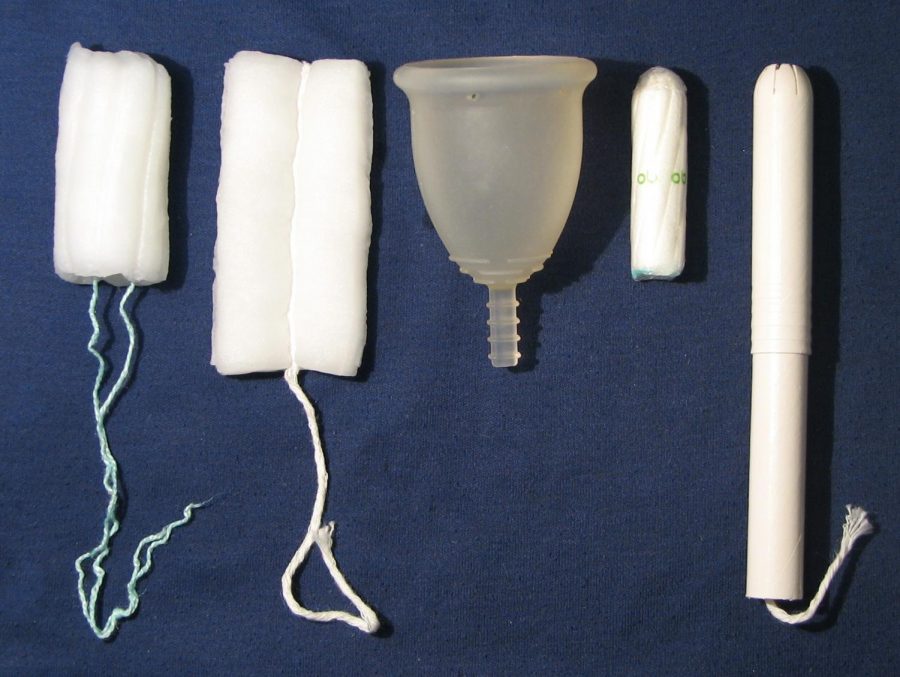Students deserve to menstruate with dignity. Period.
Photo used with permission under a Creative Commons License
RM students are working hard to ensure that menstrual health products will be available in school bathrooms.
March 13, 2019
Let me paint you a picture: You’re sitting in class, trying to keep up as your teacher is scribbling on the Promethean board. Just as you are starting to understand the complicated concepts, you feel something…
Please not today, you think. You stealthily shift in your seat for any signs of red. Not yet. Not wanting to make a scene, you cross your legs and wait for the teacher to finish speaking.
After getting permission to leave, you dash into the restroom, barely locking the stall door in your haste. Panic swells as you pull down your jeans and assess the damage. You hadn’t packed your “materials” that day and the nurse’s office will be closed during lunch.
Why? You sigh in anguish, then glance at the roll of toilet paper. Well, when life gives you lemons…
I can attest that many have encountered this scenario at one point or another.
Like sex and abortion, menstruation suffers from a sense of taboo that plagues public discourse. We treat a regularly occurring bodily function to be alien, restricting discussion on women’s health and the “pink tax” as a result. House Bill 0133, however, normalizes the issue and gives high schoolers the dignity they deserve.
House Bill 0133, “Public Schools – Provision of Feminine Hygiene Products”, reads, “A county board shall ensure that each public school serving students in any grade from grades 6 through 12 provides, at no charge to students, feminine hygiene products in the restrooms at the school.”
The Maryland State Legislature should pass this bill as a sign of solidarity with those who menstruate. Their commitment faltered earlier this month when House of Delegates Speaker Michael Busch chose to withdraw a constitutional amendment protecting abortion rights– rights which are endangered given the makeup of the U.S. Supreme Court.
I can see the opposition from a mile away. Can’t you just go to the nurse’s office? Going to the nurse’s office, assuming that it is even open, takes away more instructional time than going to the restroom.
For example, Richard Montgomery High School only has 45-minute class periods. Retrieving tampons or pads from the nurse’s office can take upwards of 10 minutes, depending on what floor you’re on, meaning you could miss about 20% of class over something you cannot control.
According to the bill’s Fiscal and Policy Note, “Research indicates that 86% of women have gotten their period unexpectedly and did not have the supplies they needed.”
Of course, not everything about the bill is perfect. HB 0133 currently does not stipulate funding, meaning that it counties would have to divert, according to the Policy Note, at least $195,000 to comply with this bill. Otherwise, the law could be ineffectual.
We can see the effects in our next-door neighbor, Virginia. According to reporter Debbie Truong, student Natalie Baumeister called out her high school in Falls Church, Va. for not adequately supplying dispensaries for tampons and pads. She–the student– provided tampons and pads because her school failed to. That’s absurd.
Funding is even more critical when you consider the impact on people who menstruate from poorer households. Outside of Montgomery County, no Maryland school district reported providing free feminine hygiene products. Everywhere else, low-income people who menstruate, in attempting to ration their pads, are at greater risk of irritation and rashes.
Data from the Maryland Department of Education shows that over 40 percent of students receive free or reduced-price meals. Based on that metric, the financial burden of feminine hygiene products is and will endanger the health of thousands of people who menstruate.
The state needs to ensure equal access to health products. Even as New York and other progressive cities take action, women’s rights should be protected equally, regardless of zip code. In amending and passing HB 0133, we will finally recognize feminine care products as a necessity, not luxury.



